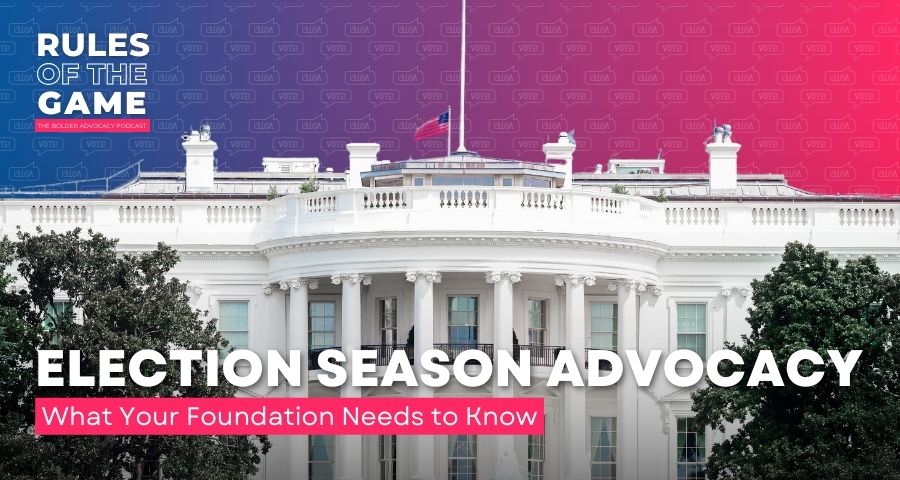Rules of the Game: Election Season Advocacy | What Your Foundation Needs to Know
Topics
Election Related Activities, Influencing Legislation, Lobbying, Private and Public Foundation Advocacy

Guess what! It’s 2024, which means we have a BIG election on the horizon. Not only will voters take to the polls to decide who will be our next President, but they’ll also be invited to speak their voice in relation to ballot measures and down ballot races that will impact our laws and determine who will represent us in local government, state legislatures, Congress, the courts, and more! With so much at stake, many private and public foundations may be curious whether they have a role to play. The answer is YES! And, this episode of the podcast will discuss the rules foundations need to know when funding and engaging in nonpartisan election activities.
Our Attorneys for This Episode:
Monika Graham
Natalie Roetzel Ossenfort Tim Mooney
In This Episode:
- General rule: Private and public foundations (as 501(c)(3) organizations) are permitted to engage in and fund nonpartisan election season activities.
- No support or opposition of candidates for public office (including candidates running in “nonpartisan” races)
- No telling people who to vote for on their ballots or encouraging them to vote for particular political parties
- Keep it NONPARTISAN. The facts and circumstances matter.
- Remember that special rules will apply to private foundations when it comes to voter registration activities and ballot measures (discussed later in this episode)
- General GOTV Activities (not talking voter registration here)
- Both private and public foundations are permitted to engage in nonpartisan get-out-the-vote (GOTV) activities
- Avoid referencing parties or candidates
- Do not suggest who people should vote for
- Use nonpartisan targeting only
- Examples
- Communications posted on social media reminding readers that “Your Vote is Your Voice” without reference to candidates and parties and without suggesting that people vote for candidates who have particular stance on issues of importance to the foundation
- Communications circulated at local events that remind people to “Vote. It’s Easy!” and provide information on where, when, and how to vote.
- Make sure you get the information correct
- Don’t target your outreach based on partisan criteria (i.e. populations / communities who you think are likely to vote for certain types of candidates)
- As always, remember that other laws (like state law) may apply to your work in addition to the tax code rules requiring nonpartisanship.
- Both private and public foundations are permitted to engage in nonpartisan get-out-the-vote (GOTV) activities
- Candidate Education
- Offer educational resources and materials to ALL candidates
- Provide only information that is previously gathered
- Avoid generating and analyzing new data or conducting new research per a candidate’s request
- But, do feel free to point candidates to information posted publicly on your website
- What if a candidate or campaign staffer calls your offices asking for talking points for an upcoming rally? Resist the urge to provide them with that information because it equates to an impermissible candidate contribution.
- Voter Registration
- 501(c)(3) Public charities (including community foundations) are permitted to engage in and fund nonpartisan voter registration activities.
- This means that not only can public foundations directly fund their public charity grantees’ voter registration drives, but they can also engage in voter registration themselves.
- Just remember to keep it nonpartisan and to follow state and federal law.
- Private foundations are subject to more restrictive rules when it comes to voter registration.
- Private foundations cannot fund voter registration drives whether they are doing it themselves or making grants earmarked for them – unless the drive is nonpartisan and conducted in 5 or more states over multiple election cycles.
- This means that many of their public charity grantees will not be eligible to receive grants that are earmarked for voter registration.
- BUT, it does NOT mean that public charities can’t use funds provided through a general support grant for nonpartisan voter registration purposes.
- 501(c)(3) Public charities (including community foundations) are permitted to engage in and fund nonpartisan voter registration activities.
- What about ballot measures?
- Ballot measures are effectively pieces of legislation, and it’s the voting public with the power to vote on them.
- Whether it’s a bond proposal, constitutional amendment, or other type of initiative, public charities are allowed to support or oppose ballot measures.
- But, because of their legislative nature, support or opposition of measures qualifies as lobbying.
- Public charities (like community foundations) are limited in how much lobbying they are permitted to do under the tax code and should count their ballot measure activities (and grants earmarked for ballot measure advocacy) against their lobbying limits.
- Private foundations are effectively prohibited from lobbying due to a steep excise tax imposed by the tax code. As such, they should avoid supporting or opposing measures and earmarking grants for that purpose.
Resources
- Investing in Change
- Community Foundations
- Private Foundations
- Election Activities of Individuals Associated with Private and Public Foundations
- April 17, 2024: Public Webinar on Foundations and Election-Related Activities